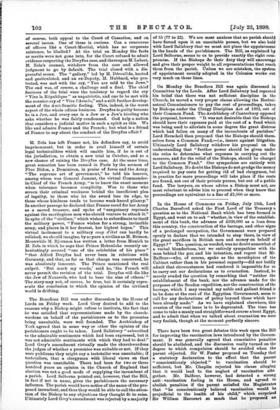The Benefices Bill was under discussion in the House of
Lords on Friday week. Lord Grey desired to add to the reasons why a Bishop might refuse to institute, the fact that he was satisfied that representations made by the church- wardens on behalf of the parishioners as to the presentee being unsuitable, were well founded. The Archbishop of York agreed that in some way or other the opinion of the parishioners ought to be taken. Lord Salisbury "subscribed to the admirable sentiments which had been expressed, but it was not admirable sentiments with which they had to deal." Lord Grey's amendment virtually made the churchwardens the judges of whether a presentee was suitable or not. If they were publicans they might say a teetotaller was unsuitable ; if teetotallers, that a clergyman with liberal views on that question was unsuitable. There had been for two or three hundred years an opinion in the Church of England that election was not a good mode of supplying the incumbent of a parish. Lord Selborne pointed out, however, that the Bill, in fact if not in name, gives the parishioners the necessary influence. The pariah would have notice of the name of the pro- posed incumbent, and thus they would be able to call the atten- tion of the Bishop to any objections they thought fit to raise. Ultimately Lord Grey's amendment was rejected by a majority
of 55 (77 to 22). We are most anxious that no parish should have forced upon it an unsuitable person, but we also hold with Lord Salisbury that we must not place the appointment in the hands of the parishioners. The Bill, as explained by Lord Selborne, seems to us to provide exactly the right com- promise. If the Bishops do their duty they will encourage and give their proper weight to all representations that reach them from the parish. Unless we are mistaken, the system of appointment usually adopted in the Colonies works out very mach on these lines.


































 Previous page
Previous page